- Home
- Franklin W. Dixon
The Clue of the Broken Blade Page 2
The Clue of the Broken Blade Read online
Page 2
The strangers asked no more questions. They finished eating before the Hardys, gave them polite good-bys, and left.
Frank said, “I think they were fishing for information, don’t you?”
“Yes,” Joe said. “But I wonder why. Do you think they are some kind of criminals?”
“I’m pretty sure of it. Did you see how they looked at each other when I told them anyone who wanted to buy a spectrograph was investigated? In the morning we had better warn the people at the Voiceprint Lab to take extra precautions against burglary.”
“But why would criminals want a sound spectrograph?” Joe asked.
Frank shrugged. “I don’t know. Anyway, it’s a good thing you didn’t spill the beans about Dad’s project.”
“Right,” Joe said. “First time I’ve ever been thankful for a kick in the ankle.”
They discussed Mr. Hardy’s catalog system. “I’m glad he put it in the Bayport Bank and Trust Company,” Frank said.
Just then they heard the sound of someone leaving the booth on the other side of the partition. Suddenly realizing that whoever had been there had heard their conversation, the boys rose and peered over the top.
They could only see the man’s back as he went out the door. He was broad-shouldered and thin-hipped, and wore a dark-blue suit. A black Homburg was perched on the back of his head.
As the Hardys sank back into their seats, Frank said, “I hope he wasn’t a crook, too. We sure gave him an earful.”
The boys were in bed by ten that night, but at three o’clock in the morning Joe suddenly sat up. He shook Frank and whispered, “Hey! I think I just heard a truck pull in behind the lab next door!”
Frank got up at once and put his trousers on over his pajamas. In less than a minute both boys were dressed and out of the motel room. Silently they moved toward the back of the Voiceprint Laboratories.
As they reached the corner of the building, they saw the outline of a truck. Even though it was a moonless night they could make out the figure of a man sneaking into the back entrance.
“Come on,” Joe whispered. “Let’s get him.”
“Not yet.”
“Why?”
“We don’t know how many are inside. If there’s a half dozen of them, they’ll clobber us.”
“Then I’ll go for the police.”
Frank put a hand on his brother’s arm. “Look, they’re coming out.”
One man emerged slowly, walking out backwards and straining under a heavy load. Then a second figure came into sight. Between them they hefted a large crate.
“Hurry,” one of them said hoarsely. “The wood’s cutting into my fingers!”
“Shut up,” came the reply. “What about me? My back’s breaking!”
Frank whispered, “On your mark, Joel”
CHAPTER III
The Legacy
THE men set the crate down, apparently to rest before lifting it onto the truck. As they stooped to pick it up again, Frank signaled Joe and the two moved forward.
“What are you doing here?” Frank called out.
The men dropped the crate and whirled. One swung a fist at Frank. The other leaped toward Joe.
Ducking, Frank drove a left, then a right into his attacker’s stomach. The man doubled over with a gasp and his hat fell to the ground.
Meantime Joe and the other man were standing toe to toe, trading blows. In the darkness they could not see each other’s faces. The man grunted when Joe landed a hard blow on his chest. But then he caught Joe in the middle of the forehead and knocked him down.
Frank was ready to finish off his man when he saw Joe fall. He turned to attack Joe’s opponent, whereupon his adversary hit him from behind with a rabbit punch, driving Frank to his hands and knees.
“Let’s get out of here!” the thug shouted.
Though dazed, Frank was aware of both truck doors being slammed shut. Then his head cleared and he looked up just as the vehicle started to pull away. The driver switched on his lights. This illuminated the rear license plate—New Jersey, FHB-548. Frank memorized it.
As he scrambled to his feet, Joe also got up. “Are you all right?” his brother asked.
“Okay,” Frank mumbled. “How about you?”
“I’ll live,” Joe said, fingering a growing lump on his forehead.
Frank went over to look at the crate the thieves had left behind. Its label showed that it contained a sound spectrograph of the same model owned by their father.
Joe whistled. “Hey, one of those guys left his hat,” he said, picking it up.
“Bring it along,” Frank said. “We’ll go back to the motel and call the police.”
When they returned to their room, Joe exclaimed, “This is the same kind of hat as the one the man was wearing in the restaurant tonight!”
Frank took the black Homburg. He examined the inside. He lifted out a hair and studied it closely. It was thick, red, and rather greasy. Taking an envelope from the writing desk, he placed the hair inside and slipped the envelope into his pocket.
“We’ll save that for the police,” he said, picking up the phone.
While Frank was calling, Joe examined the hat further. From inside the band he pulled out a folded newspaper clipping.
When his brother hung up, Joe said, “Look at this, Frank!” He showed the clipping, headlined KIDNAPPER TRAPPED BY VOICEPRINT. “It tells how a guy was arrested on account of a spectrogram,” Joe went on. “He kidnapped a young boy and telephoned the father for ransom. His voice was taped by the police and later the boy was found unharmed!”
Frank put the clue in his pocket next to the envelope. “The police will want this, too,” he commented.
Two officers arrived in a squad car five minutes later. When the boys explained what had happened, one of them put out an all-points bulletin for the truck. Then they drove the police car behind the Voiceprint Lab and illuminated the scene with their spotlight.
Along with the boys, they searched for further clues. The rear door had been jimmied, but the burglars had left no other marks.
“A robbery squad officer will be over shortly,” one of the policemen told Frank. “He’ll make the investigation inside.”
Soon a tall, leathery detective, who introduced himself as Lieutenant Howell, arrived at the scene. Frank and Joe described their encounter with the thieves, then accompanied him to their room, where they gave him the hat, the news clipping, and the strand of hair.
“I’ve called the lab manager,” Lieutenant Howell said. “He’ll be right over. We’ll go and check the building with him.”
They went back to the lab and met the manager at the door. He thanked the boys for their alertness and led them through the building. The alarm system had been cleverly disconnected, but nothing aside from the spectrograph had been disturbed.
One of the policemen came in to report that a bulletin had just come over the radio about the truck. “It was reported stolen earlier in the evening,” he said, “and has just been found abandoned at the airport.”
“Well, that’s that,” the lieutenant said gloomily. “If it hadn’t been too dark for you boys to see the faces of those men, we could have all flights checked for persons answering their descriptions.”
He told the lab manager he would arrange for a police guard until morning, since the rear door lock was broken, then left.
During the following week Lieutenant Howell had no news for the boys on the would-be thieves. Frank and Joe finished their course and received certificates attesting to the fact that they were qualified voiceprint operators.
The boys’ plane landed at the Bayport airport at noon on Saturday. Chet Morton picked them up in his jalopy. It backfired as usual, sounding like a gang war in progress. When he pulled into the Hardy driveway, the uproar brought Aunt Gertrude to the front door.
Fenton Hardy’s unmarried sister, who lived with the family, was tall and lean and had a heart as soft as a marshmallow under her decisive demeanor. She was also t
he best cook in Bayport, and that made her one of Chet’s favorite people.
Aunt Gertrude showed how glad she was to see the boys back safely by making a flurry of dire predictions.
“Well,” she declared as they carried their suitcases into the house, “you survived another trip in Chet’s mechanical monster, I see. You’ll all blow up in it yet, if you don’t get yourselves stabbed at that fencing school first. Or killed by robbers like those in Somerville.”
“How’d you hear about that, Aunt Gertrude?” Frank asked.
“The Somerville police phoned your father. He and your mother got away on their vacation, incidentally, so there will be only the three of us for lunch. Unless you’ve invited guests.”
She looked pointedly at Chet, who sniffed the aroma of freshly made chili coming from the kitchen. He grinned. “I’m available if you’re looking for somebody to invite.”
“Then wash up and hurry,” Aunt Gertrude commanded. “Lunch is in ten minutes.”
Shortly before three that afternoon Frank and Joe were on their way to the Russo School of Fencing.
“You know,” Frank said, “I’ve been thinking about the maestro’s problem. I wonder if we couldn’t give him a hand in finding the missing piece of that saber.”
Joe grinned. “You just want to have a little vacation on the West Coast!”
“Well, if he has any idea at all of the area where the saber was broken, it might be a good idea!”
They parked the car and went inside. Biff, Tony, and Phil came in a few moments later.
Russo beckoned to the Hardys while the others were changing to fencing suits. “I’ll have to leave tomorrow for Switzerland,” he announced. “Are you boys still willing to keep the school open for me?”
“Mr. Russo,” Frank began, “I’m sure the others can handle that. How would you like my brother and me to find the Adalante?”
“How do you expect to do that?”
“We thought if you had any clue at all—”
Russo shook his head. “I just don’t know. All I can tell you is there’s an old recluse named Miguel Jimenez who lives in the delta region of northern California. He is supposed to know the details of my grandfather’s duel and also where the tip end of the broken sword was found.”
“Haven’t you asked him about it?” Frank put in.
“He refuses to talk to me,” the fencing master said. “I don’t know why.” He scratched his head and looked thoughtfully at the boys.
“If I paid your fare to California, perhaps you could get the old man to tell you!”
“What’s his address?” Joe inquired.
“I don’t know. I only met him once in Stockton. He lives near there on a houseboat.”
After some discussion, the Hardys decided to leave for California on Monday.
“You’ll find that my grandfather was well known in that area,” Russo said. “There’s a book in the Stockton Public Library about him. His name was Giovanni Russo, and he was one of the richest men in the delta at the time he died. He made his fortune from the extensive vineyard he owned there.”
“Okay, maestro,” Joe said with a grin. “You just hired yourself a couple of detectives.”
Russo smiled. “Good luck,” he said. “And now you’d better change. This will be your last lesson before I leave.”
That evening Chet stayed for dinner at the Hardy home. Aunt Gertrude had baked rhubarb pie, which was his favorite, and he ate three pieces. Miss Hardy pretended to be worried that he would burst, but secretly she was pleased that he liked the pie so much.
When the boys told her they were flying to California on Monday, her concern was not feigned. She imagined all kinds of dire things that could happen to them, including getting caught in an earthquake.
Fortunately Bayport’s Chief of Police Ezra Collig stopped by after dinner and allayed her fears. The husky, keen-eyed friend of the family told her that he did not believe the doomsday prophets who kept predicting that California would slide into the ocean. “They’re the same ones who always predict the end of the world.” He chuckled. “And neither event is likely to happen in the near future.”
Collig assured Miss Hardy that the boys were well able to take care of themselves.
He had come by to see the sound spectrograph. The boys took him and Chet to the lab to demonstrate it. After recording all their voices on tape, they made spectrograms of them.
“So that’s my voice!” Chet said in amazement. “Look at those funny shapes.”
“Your voice isn’t the only thing about you that has a funny shape,” Joe needled.
“Lay off,” Chet grumbled. “I’m still growing, that’s all.”
On Monday morning Frank and Joe were packing when the phone rang.
“Maybe it’s Dad,” Frank said hopefully. They had tried to reach their parents to tell them about their trip, but with no success.
Frank scooped up the phone. It was Chief Collig.
“Bad news,” Collig said curtly. “The Bayport Bank and Trust Company was just robbed. They got three hundred thousand dollars in cash, plus the box your father had in the storage room!”
CHAPTER IV
A Phony Voice
FRANK and Joe rushed downtown to meet the chief at the bank. They found the place in an uproar. Everyone was talking at once, trying to tell what happened.
Holding up both hands for silence, Collig said, “Take it easy. First I want to hear Mr. Dollinger’s story.”
Plump Henry Dollinger was the bank’s vice-president. He said, “There were four bandits, all with nylon stockings over their heads. How they got in I don’t know, but they were concealed in various places inside the bank when we got to work.”
“When was that?” Collig asked.
“At eight-thirty. The bank doesn’t open until nine, but employees get here a half-hour early to prepare for business. One of the gang was hiding in my office closet. I was dictating a letter into my dictaphone about a quarter of nine when he stepped out, put a gun to my head, and said, ‘This is a stick-up. Make a wrong move and you’ve had it!’”
Dollinger mopped his forehead and went on. “He made me open the vault. I’m sure he must have known the time lock was set so it could be opened at a quarter of nine.”
“Where were the rest of the bandits hiding?” the chief asked.
“I don’t know. When we came out of my office, they were covering the other employees with guns and making them lie face down on the floor.”
A woman teller said they had been hiding in the bank president’s office.
A squat, muscular man who spoke with an accent said, “That was a good place for them to hide. The president is on vacation.”
Chief Collig peered at him. “Who are you?”
Mr. Dollinger answered. “He is Signor Zonko, from the Ticino Bank in Bellinzona, Switzerland. He’s here on an exchange program to study United States banking methods.”
While the Swiss and the chief were shaking hands, Joe whispered to Frank, “His accent sounds Italian to me!”
“He’s from the Italian section of Switzerland,” Frank whispered back. “That’s where Mr. Russo is going. Ticino is Italian for Tessin.”
Chief Collig asked Zonko what he knew about the bank robbery, but the man said he had arrived after it was all over, a few minutes past nine.
The chief turned his attention back to the bank’s vice-president. When he asked for descriptions of the bandits, Mr. Dollinger said the man hiding in his closet had been heavy-set, about five feet eight, and a hundred and eighty pounds. He had not particularly noticed the other three men.
The woman teller spoke up again. “One of them was tall, wide-shouldered, and had narrow hips. I noticed a wisp of red hair where the stocking was tied together over his head. It looked kind of greasy.”
Joe blurted out, “Our eavesdropper in Somerville!”
“Your what?” Chief Collig looked blank.
Joe quickly explained about the man who had been s
itting behind the partition in the motel restaurant and how later that night they had found a hat left at the spectrograph burglary scene.
“A strand of hair Frank found in the hat was red and greasy,” Joe concluded. “We turned it over to the Somerville police.”
Chief Collig agreed that it could be the same man. Then bank employees described the other two bandits. One was tall and thin, the other a heavy-set, burly man. Frank and Joe said the description fitted the two strangers who had pumped them about the Voiceprint Identification Course. When they described the men, the chief sent an officer to put all four descriptions on the air.
Frank now voiced a question that was uppermost in his mind. “What happened to the alarm system?” he asked.
“It was put out of commission,” the chief replied. “Telephone lines were cut, too.”
“I had to send one of my people out to call the police from a pay phone,” Mr. Dollinger told them.
“Therefore,” Chief Collig went on, “the thieves had been gone from the scene a full ten minutes before we even heard about it. And apparently no one saw the car they escaped in.”
Frank turned to the bank’s vice-president. “Mr. Dollinger, tell us about my father’s records.”
“The box was in our storage room in the basement,” the man began. “Things like that are not kept in the vault. The basement is protected by iron bars and locked, of course.”
A detective came over to report that there was no sign of forced entry.
“Looks as if they had inside help,” the chief said. “Knowing how to put the burglar alarm out of commission and knowing when the lock on the vault was to be opened makes it almost certain. I’ll want a complete rundown on all your employees, Mr. Dollinger.”
Joe said, “Why don’t we tape their voices and make voiceprints, Chief?”
“What for, Joe?” Frank asked. “We couldn’t compare them with anything because Dad’s catalog is gone!”

 The Great Pumpkin Smash
The Great Pumpkin Smash Who Let the Frogs Out?
Who Let the Frogs Out? Return to Black Bear Mountain
Return to Black Bear Mountain A Treacherous Tide
A Treacherous Tide Bug-Napped
Bug-Napped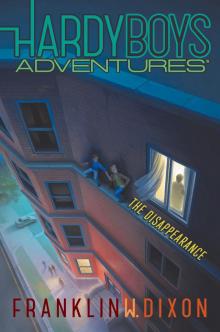 The Disappearance
The Disappearance Sea Life Secrets
Sea Life Secrets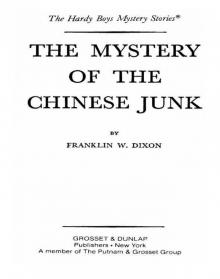 The Mystery of the Chinese Junk
The Mystery of the Chinese Junk A Skateboard Cat-astrophe
A Skateboard Cat-astrophe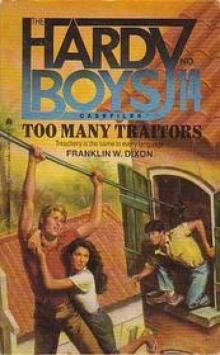 Too Many Traitors
Too Many Traitors Galaxy X
Galaxy X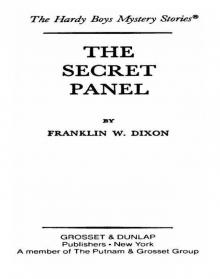 The Secret Panel
The Secret Panel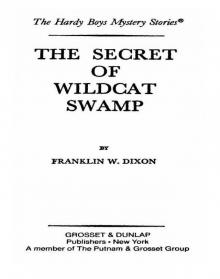 The Secret of Wildcat Swamp
The Secret of Wildcat Swamp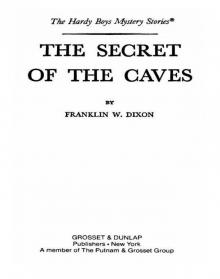 The Secret of the Caves
The Secret of the Caves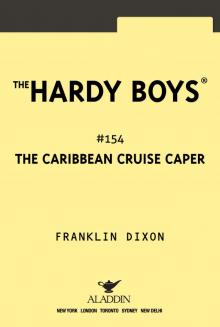 The Caribbean Cruise Caper
The Caribbean Cruise Caper Without a Trace
Without a Trace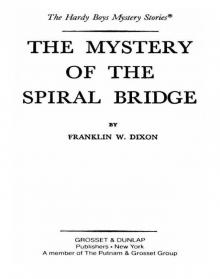 The Mystery of the Spiral Bridge
The Mystery of the Spiral Bridge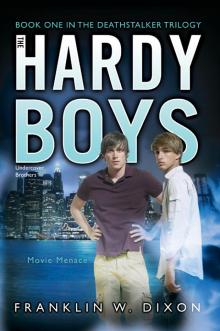 Movie Menace
Movie Menace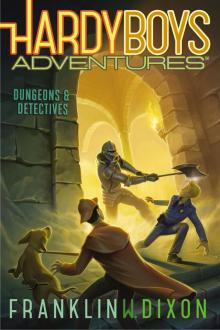 Dungeons & Detectives
Dungeons & Detectives Water-Ski Wipeout
Water-Ski Wipeout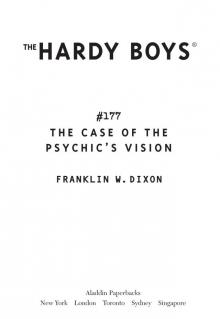 The Case of the Psychic's Vision
The Case of the Psychic's Vision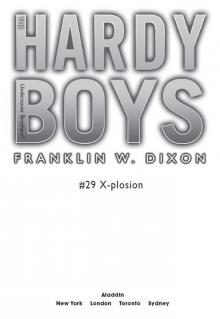 X-plosion
X-plosion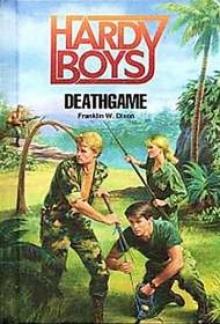 Deathgame
Deathgame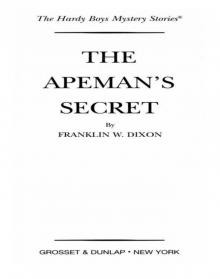 The Apeman's Secret
The Apeman's Secret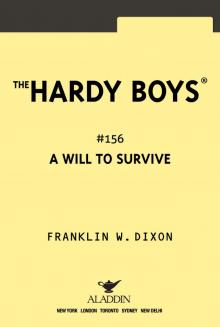 A Will to Survive
A Will to Survive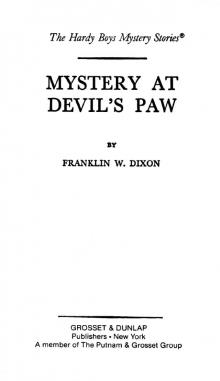 Mystery at Devil's Paw
Mystery at Devil's Paw Blood Money
Blood Money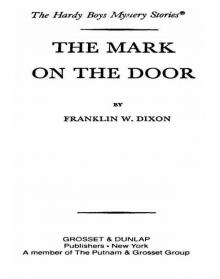 The Mark on the Door
The Mark on the Door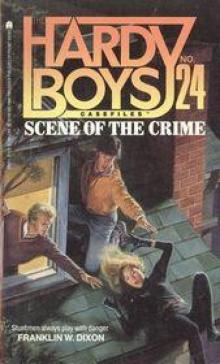 Scene of the Crime
Scene of the Crime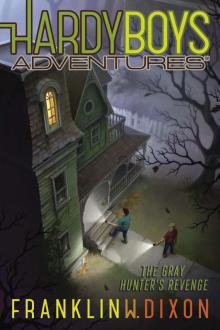 The Gray Hunter's Revenge
The Gray Hunter's Revenge Stolen Identity
Stolen Identity The Mummy's Curse
The Mummy's Curse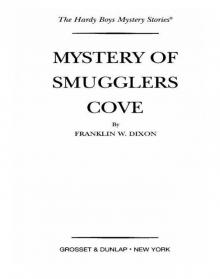 Mystery of Smugglers Cove
Mystery of Smugglers Cove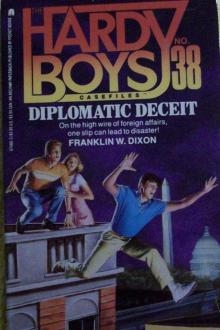 Diplomatic Deceit
Diplomatic Deceit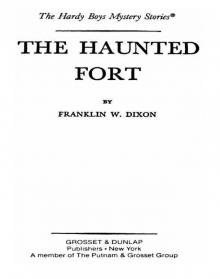 The Haunted Fort
The Haunted Fort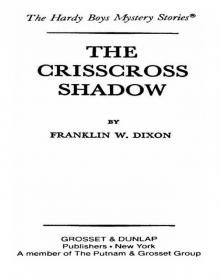 The Crisscross Shadow
The Crisscross Shadow Secret of the Red Arrow
Secret of the Red Arrow Trial and Terror
Trial and Terror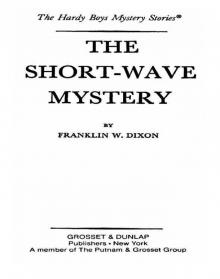 The Short-Wave Mystery
The Short-Wave Mystery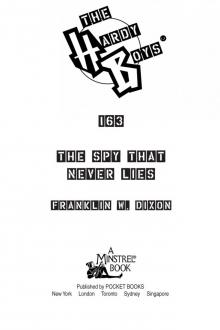 The Spy That Never Lies
The Spy That Never Lies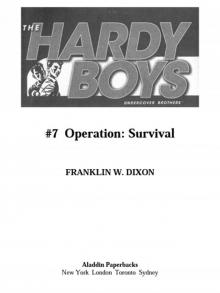 Operation: Survival
Operation: Survival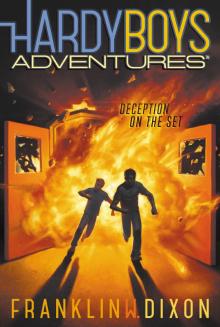 Deception on the Set
Deception on the Set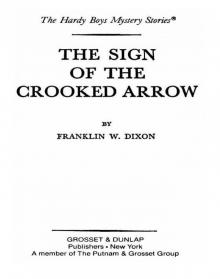 The Sign of the Crooked Arrow
The Sign of the Crooked Arrow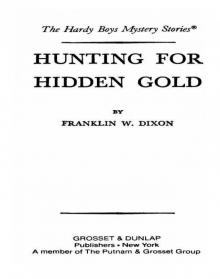 Hunting for Hidden Gold
Hunting for Hidden Gold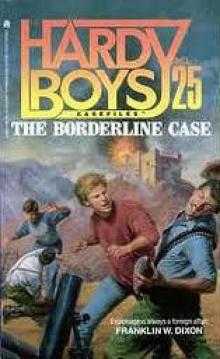 Disaster for Hire
Disaster for Hire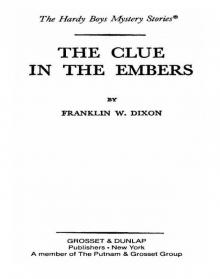 The Clue in the Embers
The Clue in the Embers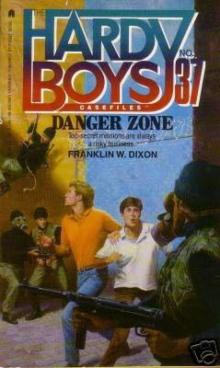 Danger Zone
Danger Zone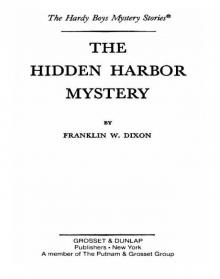 The Hidden Harbor Mystery
The Hidden Harbor Mystery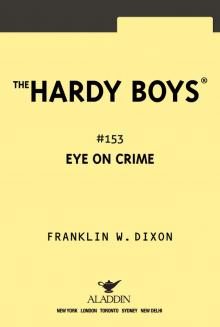 Eye on Crime
Eye on Crime A Game Called Chaos
A Game Called Chaos The Bicycle Thief
The Bicycle Thief The Missing Playbook
The Missing Playbook Survival Run
Survival Run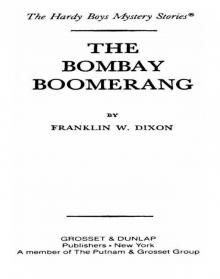 The Bombay Boomerang
The Bombay Boomerang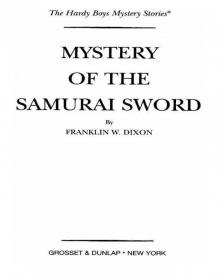 Mystery of the Samurai Sword
Mystery of the Samurai Sword Burned
Burned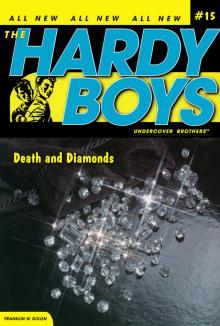 Death and Diamonds
Death and Diamonds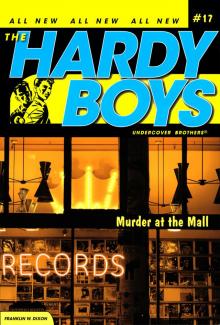 Murder at the Mall
Murder at the Mall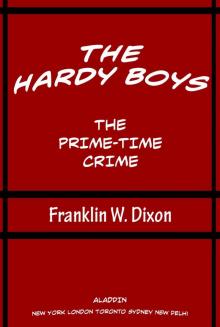 The Prime-Time Crime
The Prime-Time Crime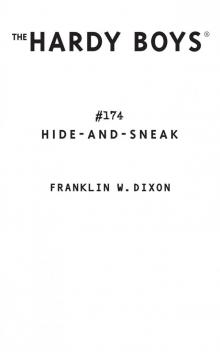 Hide-and-Sneak
Hide-and-Sneak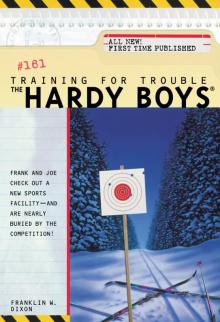 Training for Trouble
Training for Trouble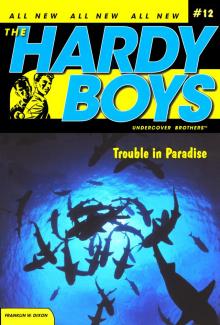 Trouble in Paradise
Trouble in Paradise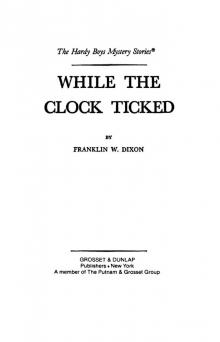 While the Clock Ticked
While the Clock Ticked The Alaskan Adventure
The Alaskan Adventure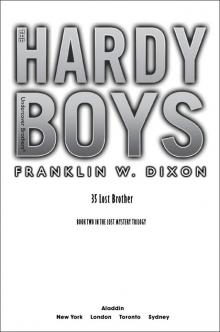 The Lost Brother
The Lost Brother Tunnel of Secrets
Tunnel of Secrets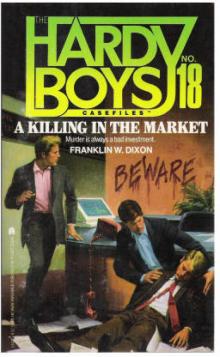 A Killing in the Market
A Killing in the Market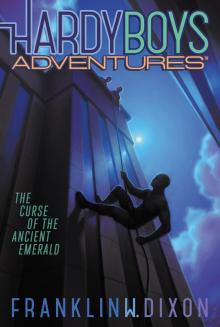 The Curse of the Ancient Emerald
The Curse of the Ancient Emerald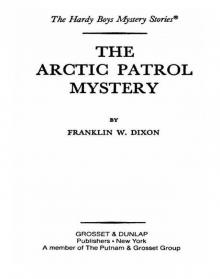 The Arctic Patrol Mystery
The Arctic Patrol Mystery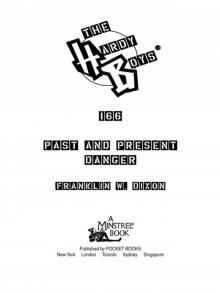 Past and Present Danger
Past and Present Danger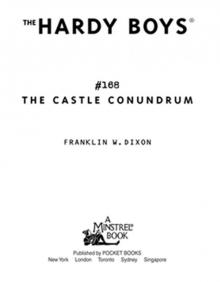 The Castle Conundrum (Hardy Boys)
The Castle Conundrum (Hardy Boys)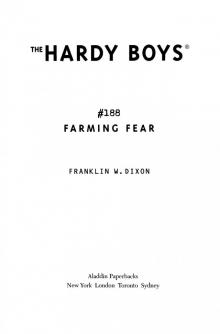 Farming Fear
Farming Fear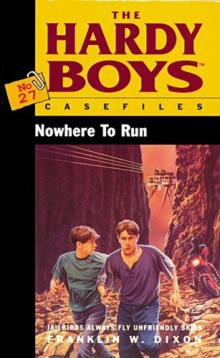 Nowhere to Run
Nowhere to Run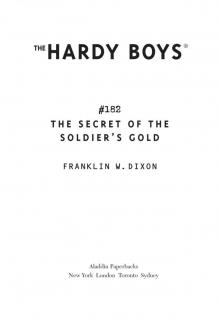 The Secret of the Soldier's Gold
The Secret of the Soldier's Gold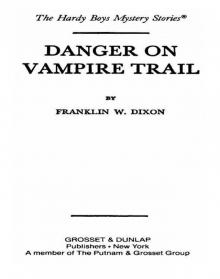 Danger on Vampire Trail
Danger on Vampire Trail The Lure of the Italian Treasure
The Lure of the Italian Treasure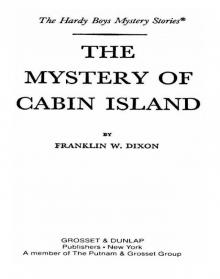 The Mystery of Cabin Island
The Mystery of Cabin Island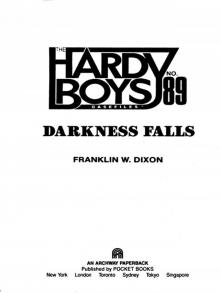 Darkness Falls
Darkness Falls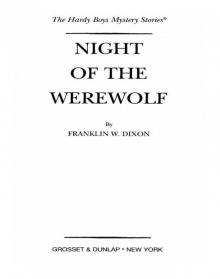 Night of the Werewolf
Night of the Werewolf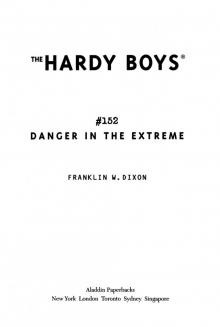 Danger in the Extreme
Danger in the Extreme The Lazarus Plot
The Lazarus Plot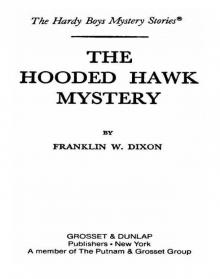 The Hooded Hawk Mystery
The Hooded Hawk Mystery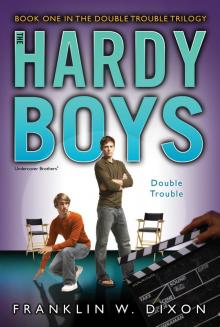 Double Trouble
Double Trouble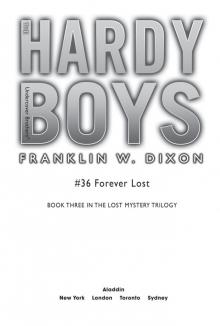 Forever Lost
Forever Lost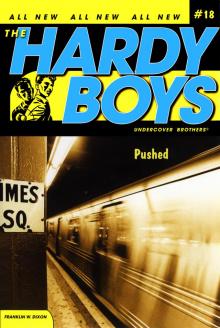 Pushed
Pushed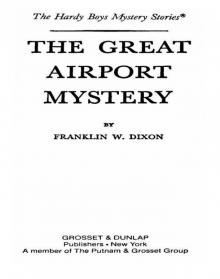 The Great Airport Mystery
The Great Airport Mystery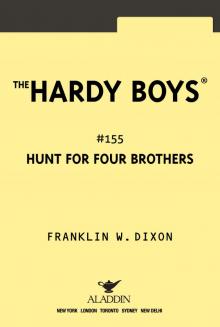 The Hunt for Four Brothers
The Hunt for Four Brothers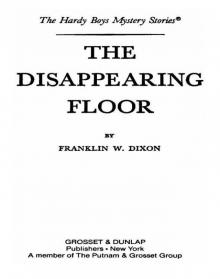 The Disappearing Floor
The Disappearing Floor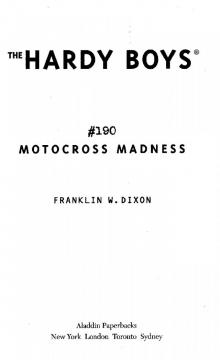 Motocross Madness
Motocross Madness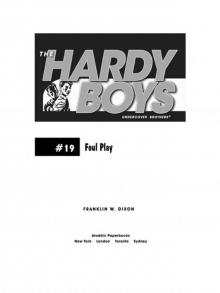 Foul Play
Foul Play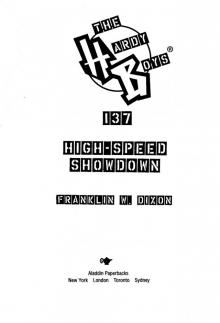 High-Speed Showdown
High-Speed Showdown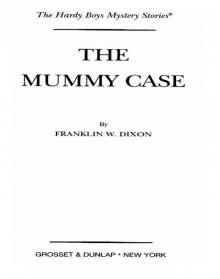 The Mummy Case
The Mummy Case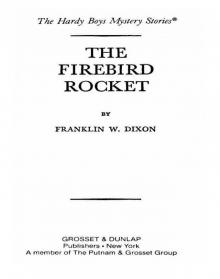 The Firebird Rocket
The Firebird Rocket Trouble in Warp Space
Trouble in Warp Space Ship of Secrets
Ship of Secrets Line of Fire
Line of Fire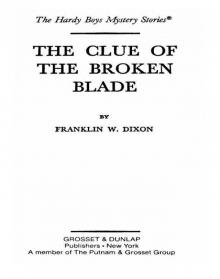 The Clue of the Broken Blade
The Clue of the Broken Blade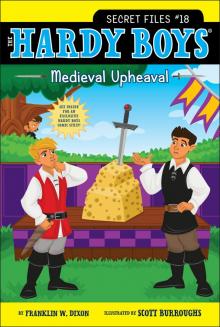 Medieval Upheaval
Medieval Upheaval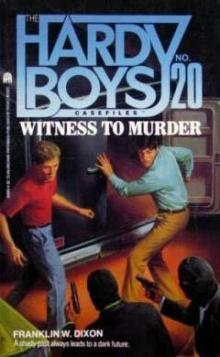 Witness to Murder
Witness to Murder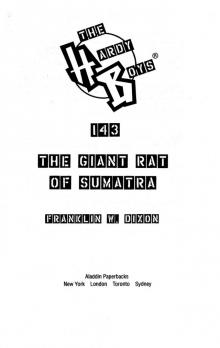 The Giant Rat of Sumatra
The Giant Rat of Sumatra Attack of the Bayport Beast
Attack of the Bayport Beast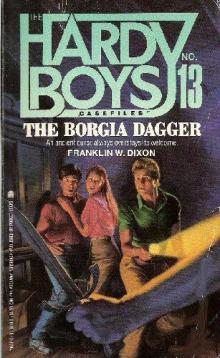 The Borgia Dagger
The Borgia Dagger Scavenger Hunt Heist
Scavenger Hunt Heist No Way Out
No Way Out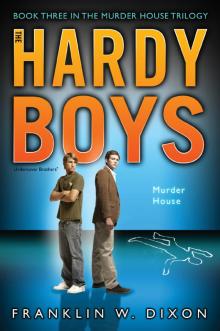 Murder House
Murder House The X-Factor
The X-Factor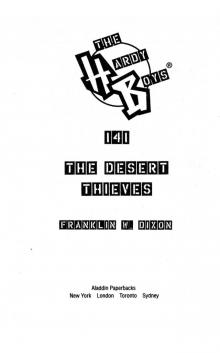 The Desert Thieves
The Desert Thieves Mystery of the Phantom Heist
Mystery of the Phantom Heist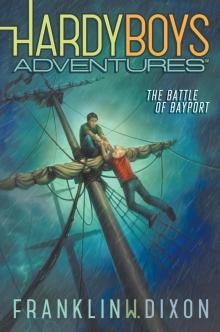 The Battle of Bayport
The Battle of Bayport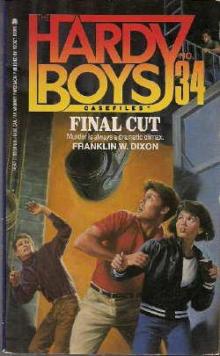 Final Cut
Final Cut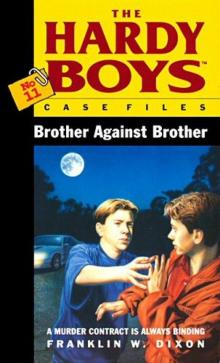 Brother Against Brother
Brother Against Brother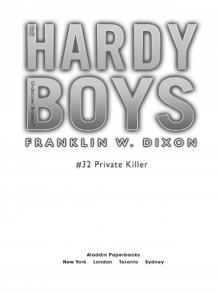 Private Killer
Private Killer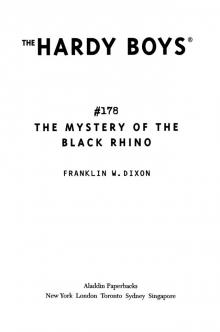 The Mystery of the Black Rhino
The Mystery of the Black Rhino Feeding Frenzy
Feeding Frenzy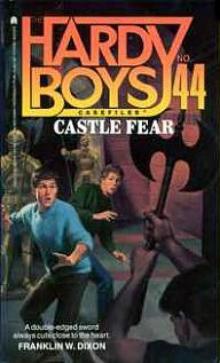 Castle Fear
Castle Fear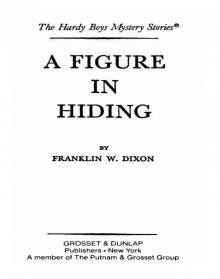 A Figure in Hiding
A Figure in Hiding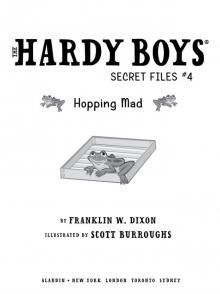 Hopping Mad
Hopping Mad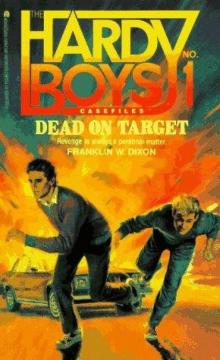 Dead on Target
Dead on Target Skin and Bones
Skin and Bones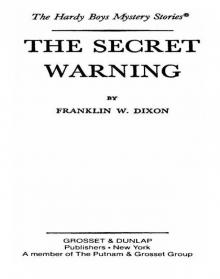 The Secret Warning
The Secret Warning Flesh and Blood
Flesh and Blood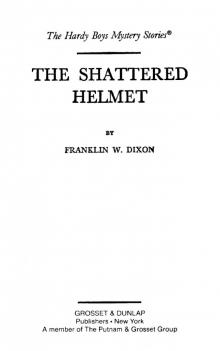 The Shattered Helmet
The Shattered Helmet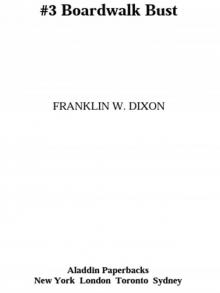 Boardwalk Bust
Boardwalk Bust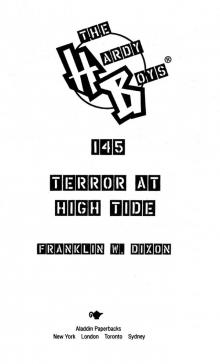 Terror at High Tide
Terror at High Tide In Plane Sight
In Plane Sight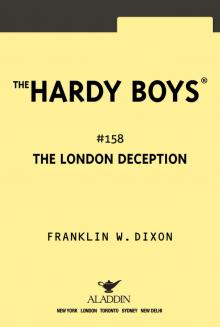 The London Deception
The London Deception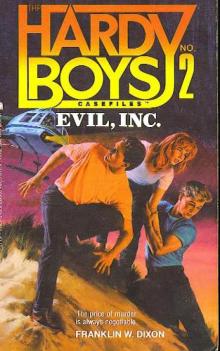 Evil, Inc.
Evil, Inc. Deprivation House
Deprivation House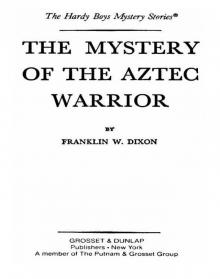 The Mystery of the Aztec Warrior
The Mystery of the Aztec Warrior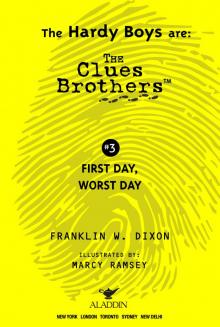 First Day, Worst Day
First Day, Worst Day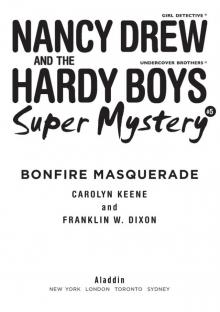 Bonfire Masquerade
Bonfire Masquerade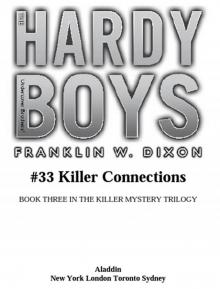 Killer Connections
Killer Connections Strategic Moves
Strategic Moves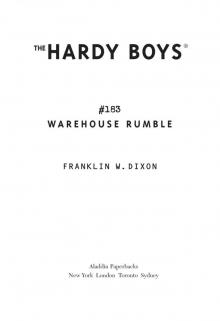 Warehouse Rumble
Warehouse Rumble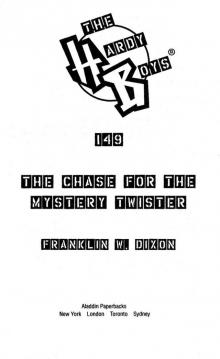 The Chase for the Mystery Twister
The Chase for the Mystery Twister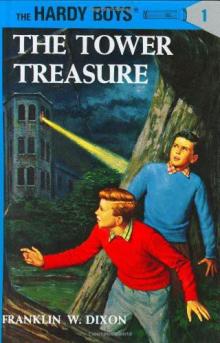 The Tower Treasure thb-1
The Tower Treasure thb-1 The Children of the Lost
The Children of the Lost The Last Laugh
The Last Laugh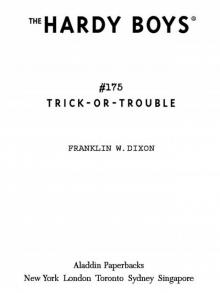 Trick-or-Trouble
Trick-or-Trouble Perfect Getaway
Perfect Getaway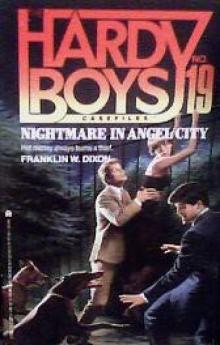 Nightmare in Angel City
Nightmare in Angel City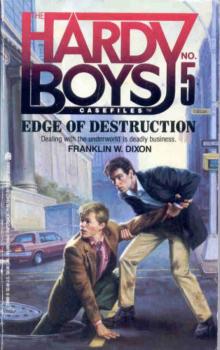 Edge of Destruction
Edge of Destruction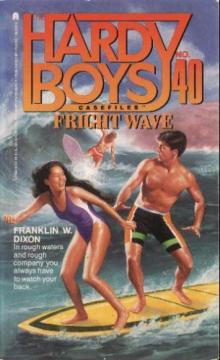 Fright Wave
Fright Wave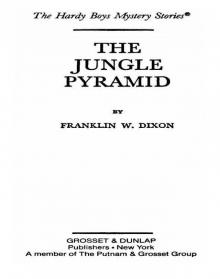 The Jungle Pyramid
The Jungle Pyramid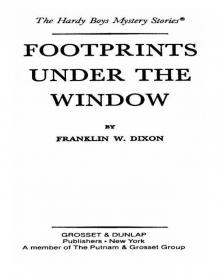 Footprints Under the Window
Footprints Under the Window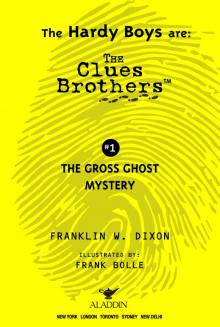 The Gross Ghost Mystery
The Gross Ghost Mystery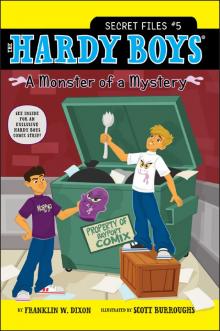 A Monster of a Mystery
A Monster of a Mystery House Arrest
House Arrest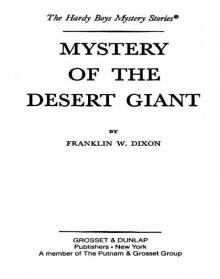 Mystery of the Desert Giant
Mystery of the Desert Giant Talent Show Tricks
Talent Show Tricks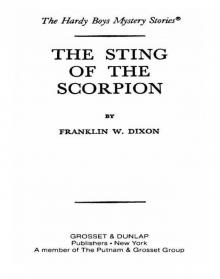 The Sting of the Scorpion
The Sting of the Scorpion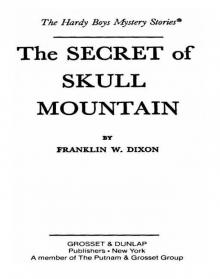 The Secret of Skull Mountain
The Secret of Skull Mountain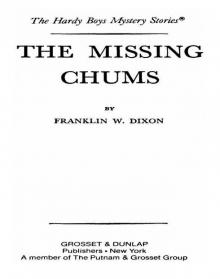 The Missing Chums
The Missing Chums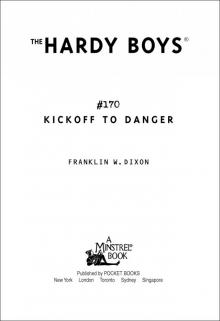 Kickoff to Danger
Kickoff to Danger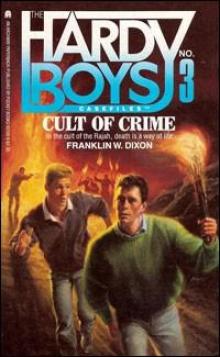 Cult of Crime
Cult of Crime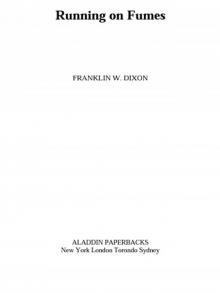 Running on Fumes
Running on Fumes Martial Law
Martial Law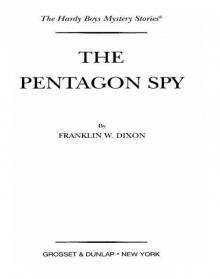 The Pentagon Spy
The Pentagon Spy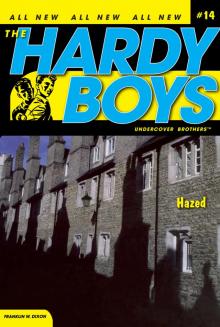 Hazed
Hazed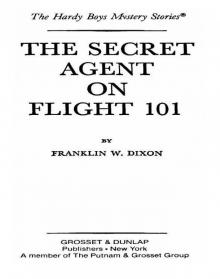 The Secret Agent on Flight 101
The Secret Agent on Flight 101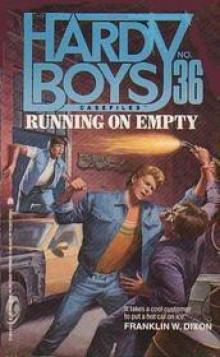 Running on Empty
Running on Empty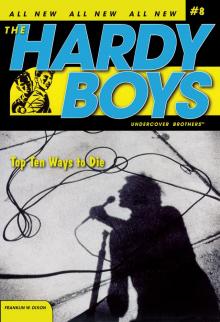 Top Ten Ways to Die
Top Ten Ways to Die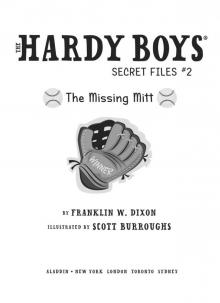 The Missing Mitt
The Missing Mitt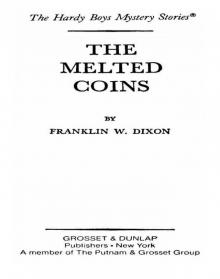 The Melted Coins
The Melted Coins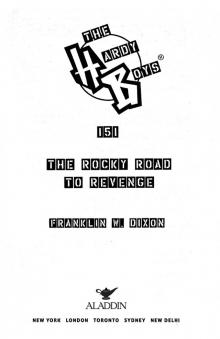 The Rocky Road to Revenge
The Rocky Road to Revenge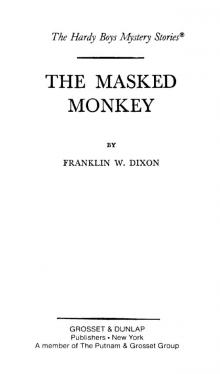 The Masked Monkey
The Masked Monkey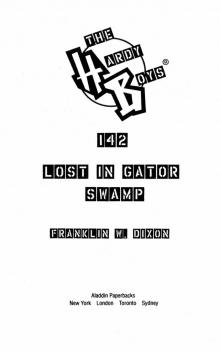 Lost in Gator Swamp
Lost in Gator Swamp Extreme Danger
Extreme Danger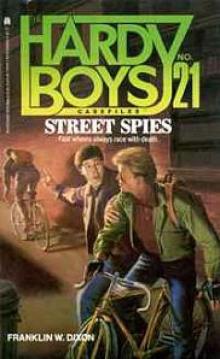 Street Spies
Street Spies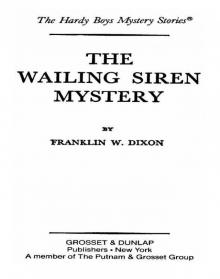 The Wailing Siren Mystery
The Wailing Siren Mystery The Dangerous Transmission
The Dangerous Transmission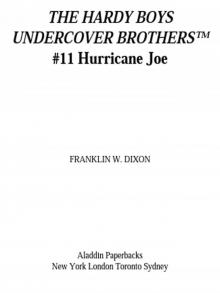 Hurricane Joe
Hurricane Joe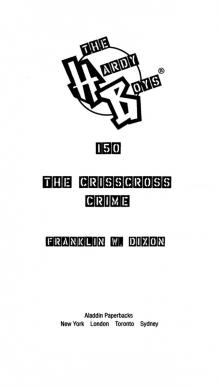 The Crisscross Crime
The Crisscross Crime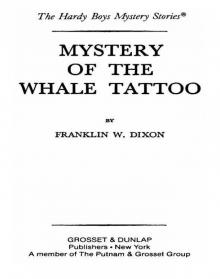 Mystery of the Whale Tattoo
Mystery of the Whale Tattoo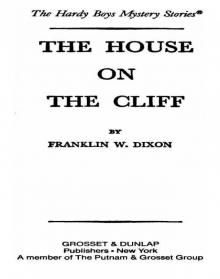 The House on the Cliff
The House on the Cliff Camping Chaos
Camping Chaos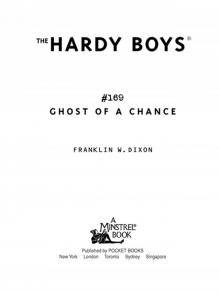 Ghost of a Chance
Ghost of a Chance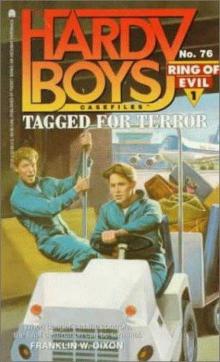 Tagged for Terror
Tagged for Terror Thrill Ride
Thrill Ride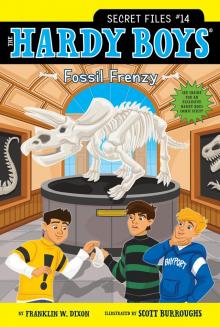 Fossil Frenzy
Fossil Frenzy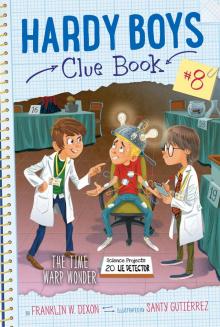 The Time Warp Wonder
The Time Warp Wonder Ghost Stories
Ghost Stories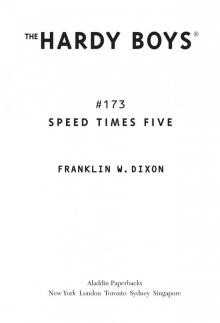 Speed Times Five
Speed Times Five What Happened at Midnight
What Happened at Midnight Three-Ring Terror
Three-Ring Terror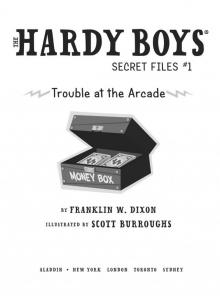 Trouble at the Arcade
Trouble at the Arcade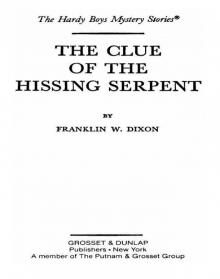 The Clue of the Hissing Serpent
The Clue of the Hissing Serpent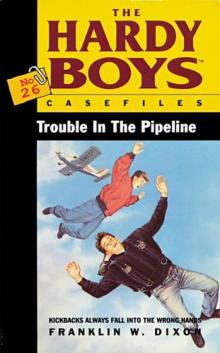 Trouble in the Pipeline
Trouble in the Pipeline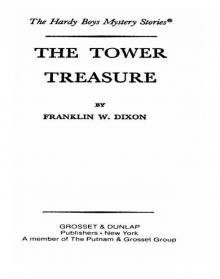 The Tower Treasure
The Tower Treasure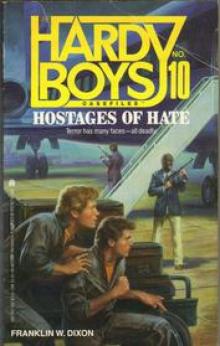 Hostages of Hate
Hostages of Hate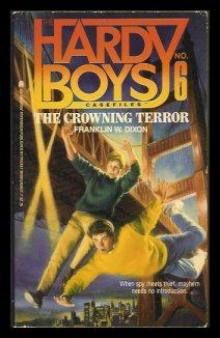 The Crowning Terror
The Crowning Terror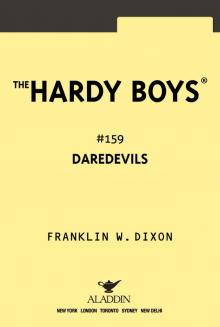 Daredevils
Daredevils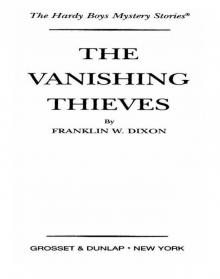 The Vanishing Thieves
The Vanishing Thieves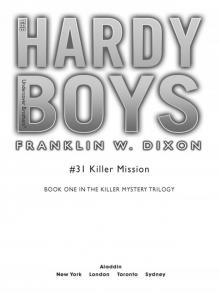 Killer Mission
Killer Mission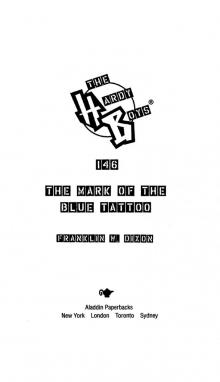 The Mark of the Blue Tattoo
The Mark of the Blue Tattoo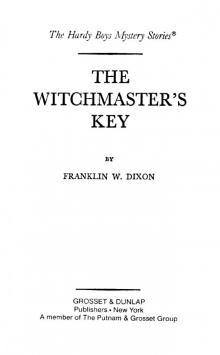 The Witchmaster's Key
The Witchmaster's Key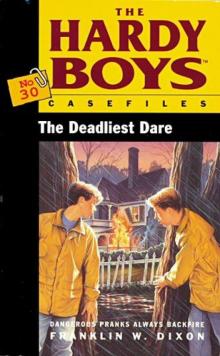 The Deadliest Dare
The Deadliest Dare Peril at Granite Peak
Peril at Granite Peak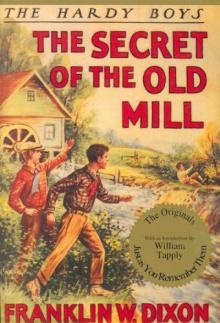 The Secret Of The Old Mill thb-3
The Secret Of The Old Mill thb-3 Rocky Road
Rocky Road The Demolition Mission
The Demolition Mission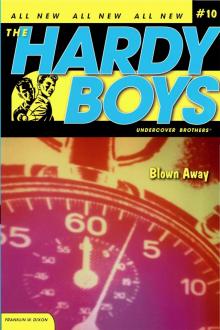 Blown Away
Blown Away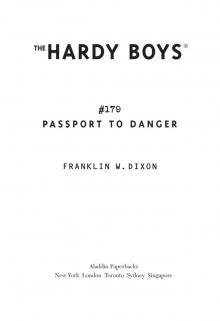 Passport to Danger
Passport to Danger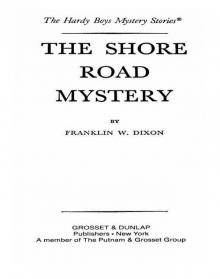 The Shore Road Mystery
The Shore Road Mystery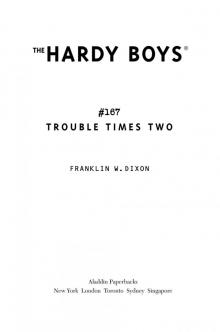 Trouble Times Two
Trouble Times Two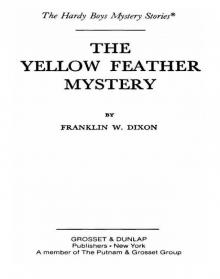 The Yellow Feather Mystery
The Yellow Feather Mystery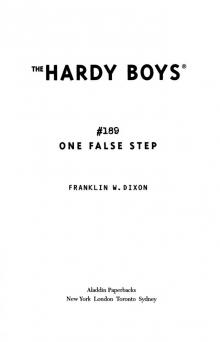 One False Step
One False Step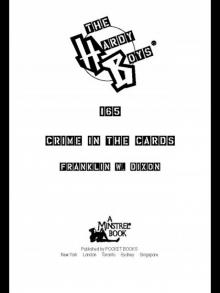 Crime in the Cards
Crime in the Cards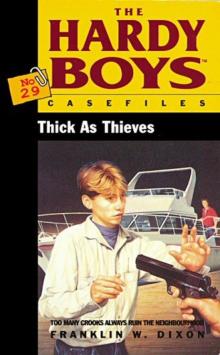 Thick as Thieves
Thick as Thieves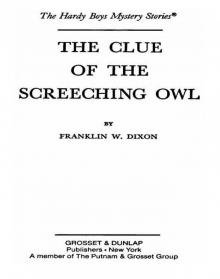 The Clue of the Screeching Owl
The Clue of the Screeching Owl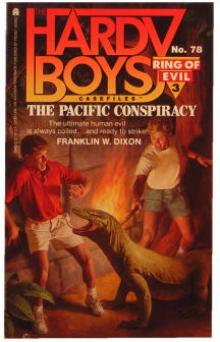 The Pacific Conspiracy
The Pacific Conspiracy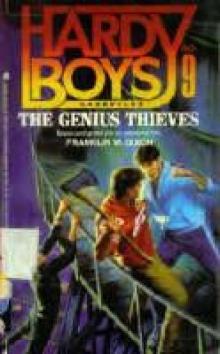 The Genius Thieves
The Genius Thieves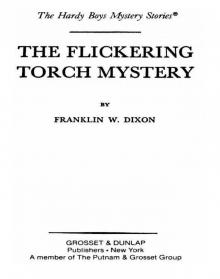 The Flickering Torch Mystery
The Flickering Torch Mystery Into Thin Air
Into Thin Air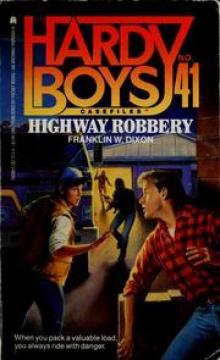 Highway Robbery
Highway Robbery Deadfall
Deadfall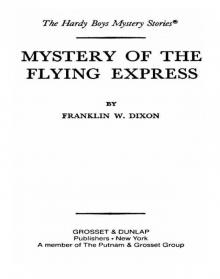 Mystery of the Flying Express
Mystery of the Flying Express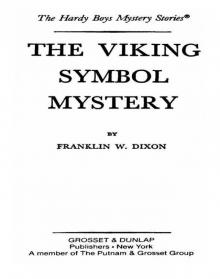 The Viking Symbol Mystery
The Viking Symbol Mystery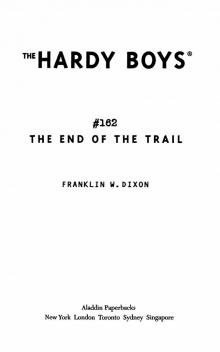 The End of the Trail
The End of the Trail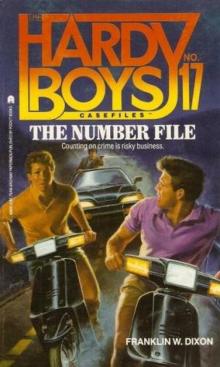 The Number File
The Number File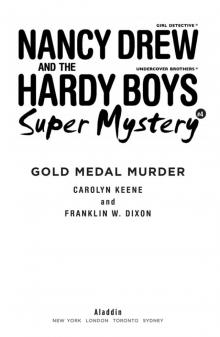 Gold Medal Murder
Gold Medal Murder Bound for Danger
Bound for Danger Collision Course
Collision Course The Madman of Black Bear Mountain
The Madman of Black Bear Mountain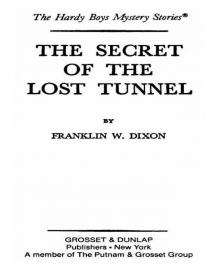 The Secret of the Lost Tunnel
The Secret of the Lost Tunnel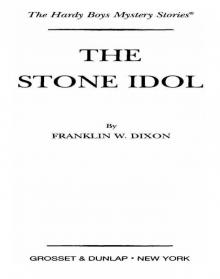 The Stone Idol
The Stone Idol The Secret of Pirates' Hill
The Secret of Pirates' Hill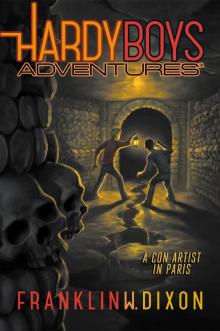 A Con Artist in Paris
A Con Artist in Paris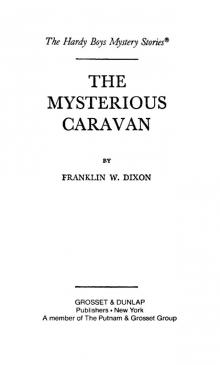 The Mysterious Caravan
The Mysterious Caravan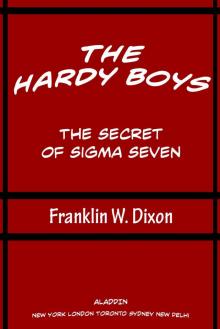 The Secret of Sigma Seven
The Secret of Sigma Seven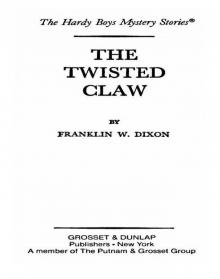 The Twisted Claw
The Twisted Claw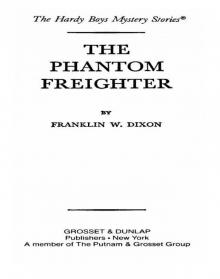 The Phantom Freighter
The Phantom Freighter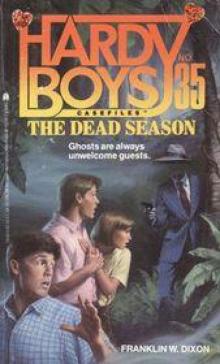 The Dead Season
The Dead Season The Video Game Bandit
The Video Game Bandit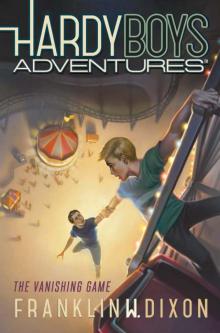 The Vanishing Game
The Vanishing Game Typhoon Island
Typhoon Island